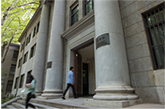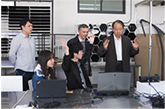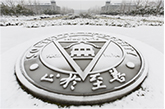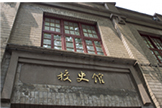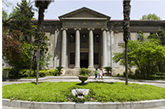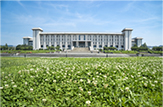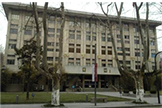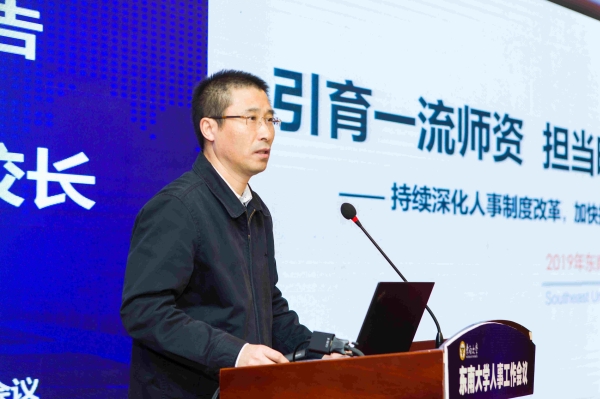
[Southeast University News Network, December 9] (Correspondent: Long Li; photographer: Hang Tian) On Dec. 6, Southeast University convened the meeting on personnel affairs at Jiulonghu Campus. With the theme of “never forget the original intension and firmly keep in mind the mission to deepen the reform of the personnel system and build a world-class university”, in the meeting, leaders of SEU summarized the achievements as made and the experience as accumulated in the latest years in respect of personnel affairs, deeply analyzed pertinent problems, challenges and opportunities available in the new era, planned significant strategies, working ideas and specific measures regarding personnel affairs in the future.
In the meeting, President Zhang Guangjun delivered a keynotereport titled “the introduction of the first-class teachers to fulfill the mission of the era: to continuously deepen the reform of the personnel system and accelerate the strategy of strengthening the school by talents”. He expounded on new concepts, new ideas and new paths regarding the personnel affairs throughout the school from such three perspectives as the mission of the era, the current bottlenecks and the thinking about development. First of all, he analyzed the significance of the mission of the university and the importance of the faculty to the establishment of a successful university, pointed out the new missions and assignments regarding personnel affairs that the school should shoulder in the new era upon the calling the Central Party Committee for higher education in China and the entrustment of General Secretary Xi Jinping on higher education and construction of the teachers’ team. Afterwards, he summarized the status quo of our school’s teaching staff with detailed data and actual conditions, Meanwhile, he also pointed out the bottlenecks that our school have encountered such as insufficient high-level talents and innovative teams, deficient driving force of the personnel system and mechanism.
On this basis, Zhang Guangjun expounded his thoughts on personnel affairs. In the face of the new era and new missions, he emphasized the necessity of inheriting the school’s running philosophy of “getting renowned with science and serving the country with talents”. Based on SEU’s “1-10-100” dream and in accordance with SEU’s schooling thoughts of “orienting towards the frontier science and technology, service strategy, teachers and students based, and talents in priority” and the development strategy of “multi-disciplinary integration, the comprehension of science, literal arts, engineering and medicine sciences, the integration of production, learning and research, and international cooperation”, efforts should be made to accelerate the school’s “five transformations”, that is, the transformation of the school’s positioning from “engineering in priority” to “multi-disciplinary integration”, the transformation of the school’s development objective from “a domestic first-class school” to “a world-class school”, the transformation of talent cultivation from “the talents of tremendous promise” to “the leading talents”, the transformation of scientific researches from “demands fulfillment” to “service strategy”, the transformation of cultural spirit from “simplicity and truth” to “striving for perfection”; besides, efforts should also be made to run the school from such four perspectives as “inheritance and development, independence and opening, science and humanities, support and leading”. He also pointed out the necessity of advancing the personnel affairs through objective restructuring, deepened reform, vitality stimulation and leading development. In terms of objective remodeling, we must build a dynamic teaching team in accordance with the “six essential requirements” as emphasized by General Secretary Xi Jinping so as to produce academic masters with international influences in a continuous manner, and aim at realizing the school’s target in respect of colleges and teachers’ scale in 2025, 2030 and 2035 respectively. In terms of the deepened reform, we must follow the guideline of “being based on the intramural reform, deepening overseas expansion, focusing on high-end breakthroughs and orienting towards the future development”, strengthen the overall layout, the ideological guidance, the morality establishment and talent cultivation as well as the system guarantee. In terms of vitality stimulation, we should make breakthrough from the personnel system to establish a “visible, open, constraining and motivated” management mechanism, and thus continuously reinforce the endogenous driving force for the teachers’ comprehensive development. In terms of leading development, we must take the lead in the model of first-class talents cultivation, scientific and technological innovation and development, lead the regional and national economic and social development, cultural inheritance, innovation and human civilization. In the end, Zhang Guangjun expected that all the faculty should keep in mind of their original intentions and missions, closely integrate the theme-based education with the implementation of the spirits of the Fourth Plenary Session of the 19th CPC Central Committee, and do a better job of personnel management and talents cultivation with a more vigorous attitude and more conscious actions, strive for the early realization of SEU’s “1-10-100” dream and the Chinese Dream of the great rejuvenation of the Chinese nation.
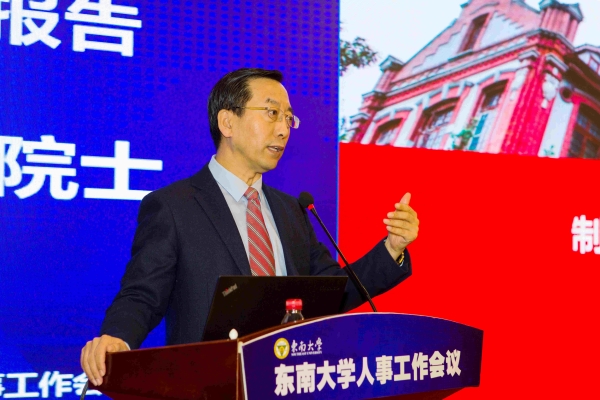
Academician Zhang Jie, the former president of Shanghai Jiaotong University, was invited to give a report titled “University Governance-People-oriented Incentives”. He started from the academic foundation of the incentive system, proposed that the core of modern university governance system should lie in the establishment of a people-oriented institutional incentive system, the core of the governance of universities and innovative organizations should lie in the stimulation of new vitality. In this sense, the colleges and universities should stimulate the innovative vitality of teachers, students and other individuals so as to build a modern university governance system, and eventually “please domestic talents for utmost use of their capacity and be admired by overseas talents for attractions”. Taking the system reform of Shanghai Jiaotong University as an example, Zhang Jie introduced the thinking and experience of establishing an endogenously driven and innovative university from the aspects of faculty building, high-level talent introduction, innovative talent cultivation, discipline construction, personnel system reform and management, etc..
Vice President Liu Pan made a keynote speech titled “Deepening the Reform of the Personnel System to Build a First-Class Faculty Team”. He introduced in detail the school’s objective of “accelerating the pace of building a world-class university”, vigorous implementation of the talent strategy of “strengthening the school with talents” and “the high-end staff multiplication plan” in recent years so as to continuously advance the reform of the personnel system, make innovations in the model of talent introduction, optimize the talent team structure and improve the talent growth environment, etc.. Therefore, significant achievements in personnel have been made. At the same time, in the context of the new round of national personnel system reform carried out in colleges and universities, Vice President Liu further analyzed the problems and deficiencies of high-level talents and teams, academic structure, internationalization, overall vitality, and mechanism driving force. On this basis, he clearly put forward the overall layout of the school’s personnel system reform and specific measures in deepening the talent introduction and cultivation system, the evaluation and incentive system, the employment and remuneration system, etc..
In the meeting, “Advanced Collectives of Personnel Work”, “Zijin Young Scholars” and “Zhongying Young Scholars” were commended and the certificates were then issued.
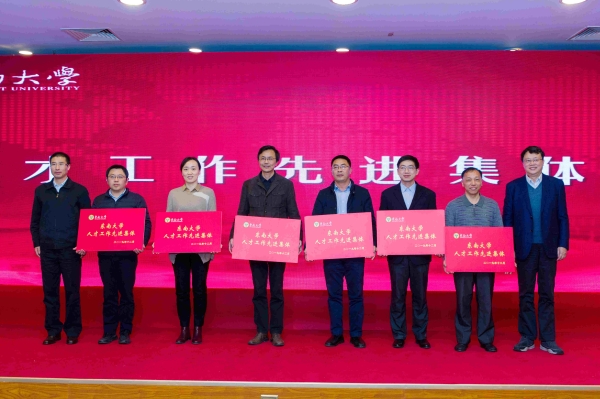
In the afternoon, 13 Zijin young scholars launched a young scholars salon, where they gave wonderful keynote reports. The other participants were divided into three groups to carry out profound exchanges and discussions about how to steadily advance the reform of the personnel system, enrich the high-end teacher reserves, expand the channel for talent introduction, optimize the structure of the teaching staff, stimulate the vitality of the teaching staff, improve the employment and evaluation mechanism, improve the classification evaluation system, and improve the level of management services, etc.. And then they reported to the meeting.
After group discussions and reports, Zuo Wei, Party Secretary of SEU, made a conclusion speech. He pointed out that the competition for the development of colleges and universities would fundamentally lie in the competition in respect of goals, ideas, concepts and efficiency, and it is also the competition for high-end talents. The reform of the school’s personnel system is not only important to advance the school governance and modernize the governance system, but also important to carry out comprehensive reform, which is an overall, comprehensive and critical reform. The school’s personnel reform should see clearly the general trend and direction, clarify ideas and strategies, and prepare appropriate schedule and agenda. The school has to stimulate the staff’s endogenous motivation, development potential and innovative vitality, reflect the performance-oriented distribution of assignments, and promote the “double first-class” construction and the cultivation of leading talents through the reform of the personnel system. In addition, the school’s requirements on personnel reform shall match with the goal of constructing a “double first-class” university, be consistent with the school’s development and progress, and be comparable with brother universities of equivalent high level. At the same time, in the process of personnel reform, efforts should be made to well deal with the relationship between fundamental and specific interests, short-term and long-term goals, general and special circumstances, major and general groups, national and school regulations, reform and stability, stocks and increments, prerequisite and sufficient conditions.
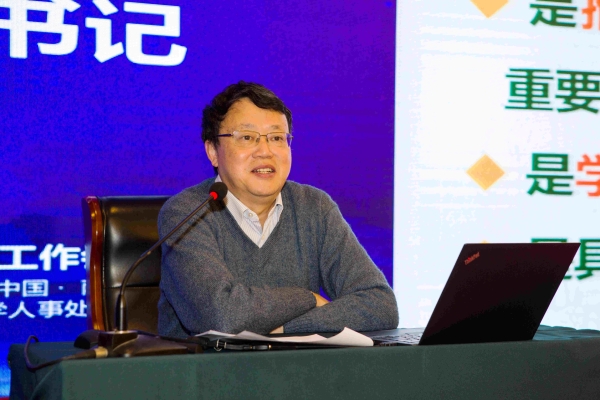
Finally, Zuo Wei pointed out that today's meeting would not only represent a summary of the school’s personnel work in the past period, but also a mobilization meeting of personnel work in the context of a new era, new ideas, new goals and a new journey. He emphasized that all departments of the school, while guided by Xi Jinping’s thoughts on socialism with Chinese characteristics in the new era, should promote personnel reform in a unified manner from the height of implementing the spirit of the Fourth Plenary Session of the 19th CPC Central Committee and also from the height of improving the school’s governance system and governance capacity. Meanwhile, the school should strengthen the party’s leadership, adhere to the fundamental assignments of morality establishment and talent cultivation, persist in reform and innovation, persist in overcoming difficulties, and work together to promote deep reform and development throughout the school; well study, understand, properly publicize and explain various reform policies; promote the implementation of various reforms with firm determination and positive measures; prevent the possibility of slogans in replacement of work and implementation; speed up the reform of the school’s personnel system and promote the school’s “double first-class” construction for continuous and new achievements.
It is reported that this meeting is another school-level meeting about personnel affairs since 2012. The meeting was presided over by Managing Vice President Wang Baoping. More than 300 people, including leaders of all colleges and departments, principals of Party and administrative departments, heads of functional departments and directly affiliated units, directors of affiliated Zhongda hospital and representatives of high-end talents, etc. attended the meeting.
Submitted by: the Personnel Department
(Editor-in-charge: Ji Hong, reviewed by: Song Yechun)


